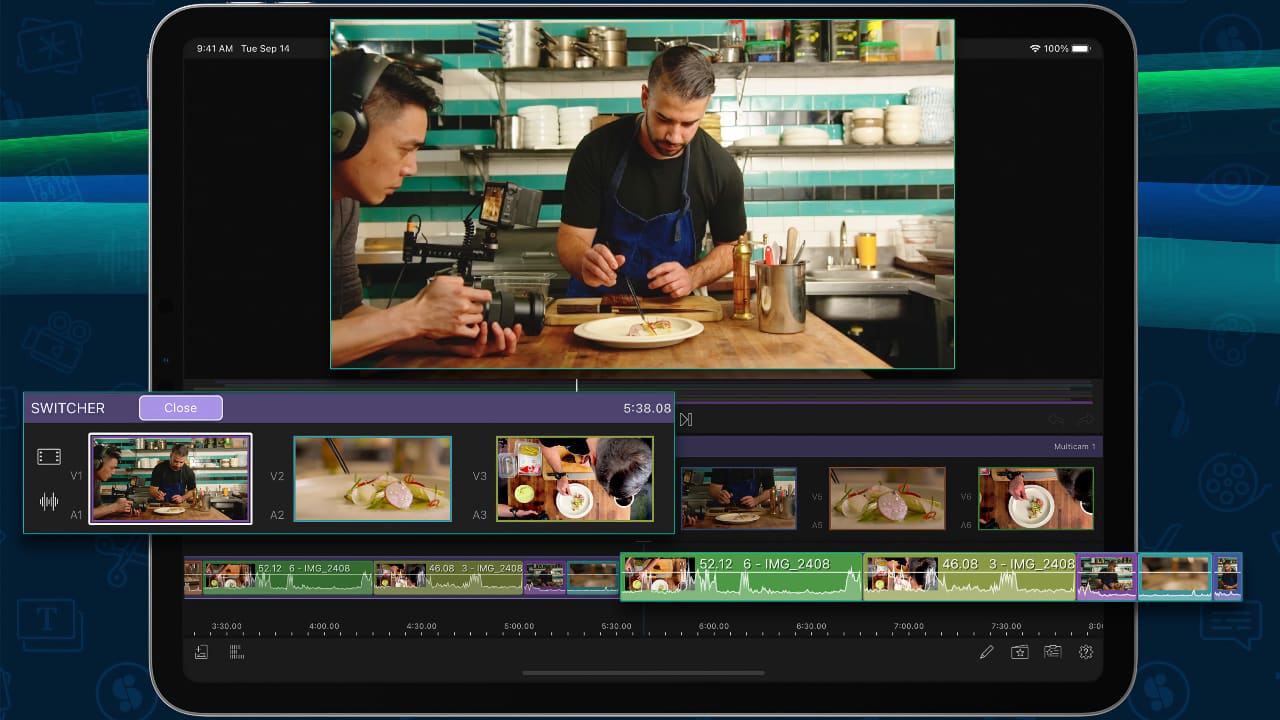
LumaTouch, the company behind mobile editing app LumaFusion, recently turned ten years old, which seems an ideal opportunity to talk to its founders about where mobile filmmaking has been and where it’s going.
LumaTouch, creators of the mobile editing app LumaFusion, recently turned ten years old. I had a chance to correspond with co-founders Terri Morgan (also Principal Designer) and Chris Demiris (and Principal Engineer) about the origins of the company and its NLE app, the growth in mobile editing, and what the next ten years may look like for the technology.
RedShark News: Let's start with the origins of LumaTouch a decade ago.
Chris Demiris: Terri and I worked together building Pinnacle Studio for iPad while at Avid during the first days of iPads [in the early 2010s]. We learned that we had a unique combination of talents that worked incredibly well together, and felt we could build something much better, starting from scratch, and taking advantage of the quickly improving technology that Apple was providing with iOS.
RSN: How did LumaFusion become such a strong force in mobile editing and filmmaking?
CD: We were the first to envision professional video editing on mobile devices. Our passion for the product showed in everything we did, and we found the sweet spot of a professional editing tool that is fun and easy to use. As other competitors came to market, they leaned either towards simple editing without giving the editor control or bringing the desktop to mobile, which loses so much of what makes mobile video editing great.
.jpg?width=700&height=980&name=chris-demiris-LumaTouch%20(1).jpg)
Chris Demiris: "We were the first to envision professional video editing on mobile devices."
RSN: Let's talk about how education plays a key part in LumaTouch; why is that so important?
CD: LumaTouch has always kept aspiring editors at the forefront of what we do, and giving aspiring editors powerful tools that they can take anywhere has made it possible for more people than ever to tell their stories through video. And exactly the way they want to say to them.
Content creators are storytellers, but we’ve found they also have this amazing desire to learn and absorb as much as they can - they search out meaningful information, tutorials, helper videos, and even classes to improve their craft. For some, they want to learn the basics of video editing and storytelling and just need help getting to know simple workflows to help them start piecing together their stories. That’s why we’ve put such an emphasis on creating the kind of content that will help storytellers at every level and every stage of their journey.
Our team at LumaTouch is 100% dedicated to creating educational content. And we’re also developing programs to help schools and higher education institutions to create curriculum that helps develop and advance storytelling through video editing skills. There are so many amazing stories out there, and if we can play even a small part in helping people craft and share them, we’ve won. That’s really what we’re all about!
RSN: How did The Curious Editor YouTube series come about?
Terri Morgan: My passion for editing is boundless, but I also like to tinker with other apps to move my projects forward. It’s astounding how much you can achieve using only mobile apps, so with The Curious Editor series, I explore using mobile apps to take you through your whole project from start to finish. The series focuses on creativity and storytelling, and while a specific system isn’t required, often mobile apps can provide a more direct and intuitive canvas for being creative. There are amazing non-subscription apps for just about everything from shooting to storyboarding, animation, color, and editing. Of course, LumaFusion is one of those apps, but most of the series so far has been about expressing your creativity using all sorts of apps.

Terri Morgan: "Mobile filmmaking, for most people, is now just filmmaking."
RSN: Looking towards the future, where is LumaFusion heading next?
TM: We’ve made LumaFusion from the ground up, focusing on features you need to tell a good video story. As our audience becomes more advanced storytellers, their needs are always changing, and the tools required to illustrate their stories are always advancing. So LumaFusion will always have the goal to keep our customers delighted with new features that match their creative needs. To do that, we will continue to examine the editor’s workflow to find areas where we can innovate and refine the storyteller’s journey.
CD: We’re continually building on the great foundation we created with LumaFusion to improve functionality that our users might miss from the desktop and rethink that functionality to make it easier and touch-centered. Currently, our focus is on animation and new effects, but we’re looking at improvements in every area of user workflows.
RSN: What are the most significant upcoming developments in smartphone tech that will aid LumaFusion? How much will AI play a part in it?
Terri & Chris: Editing is a creative process and we get a lot of joy through creating stories. Akin to making music, it would be fun to have AI play our guitar or piano once or twice, but we would never want AI to take over playing our guitar, nor would we want AI to tell our stories all the time. However, we sometimes want to create the main melody with our guitar or piano and use AI for background music.
Likewise, LumaFusion will continue to focus on creating a joyful editing experience and will use AI for background tasks that enhance editing, like voice isolation (already in LumaFusion), AI-person-keying, speech-to-text, and text-based editing. These are all areas where we think AI can free up the editor to be even more creative. Apple’s careful approach to AI matches with what we like to do: carefully bringing AI into LumaFusion in places where it can make it easier for editors to be creative rather than taking away creativity from the user.
RSN: Where do you see mobile filmmaking in the next ten years?
TM: Mobile filmmaking, for most people, is now just filmmaking. If you asked me five years ago what my goals were, I would have said that we wanted to help people realize they have an incredibly high-quality tool sitting in their pocket to shoot and edit a professional movie. Mission accomplished!
I think almost everyone has experienced the incredible flexibility and quality you can enjoy with the camera right on your phone. News organizations have known it for years, and even Hollywood has leveraged these incredible tools. Now, my goals for LumaFusion are to help people get past the question of device type and turn to the more interesting questions about creativity and storytelling like, “What do we need to develop, and how can we provide software that respects the creative process while also being there with the right feature at the right moment... like magic!" And “Where are the broken pieces of the process that we all use today, and can we develop something new to fix it?”
Tags: Production Mobile editing


Comments